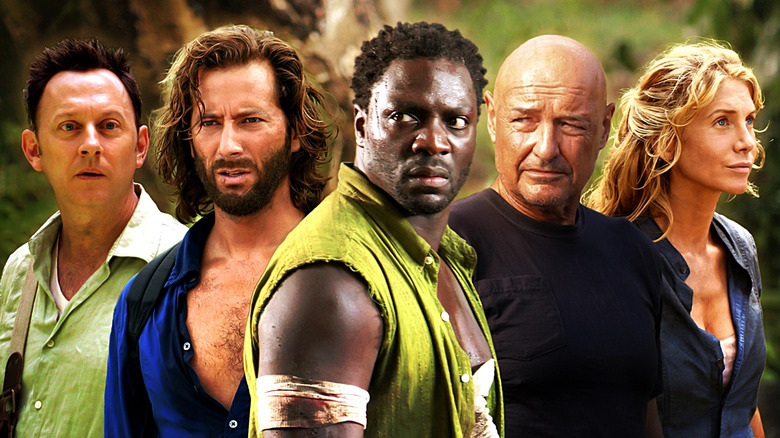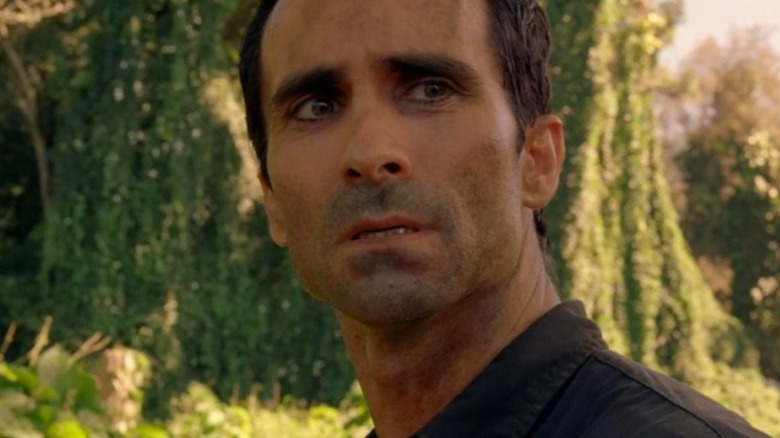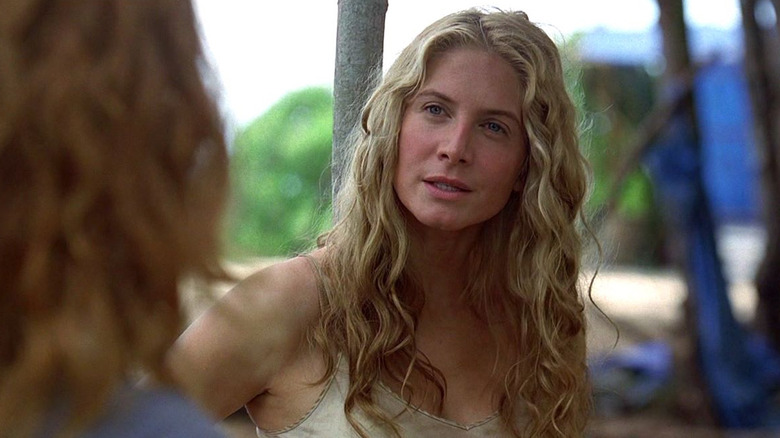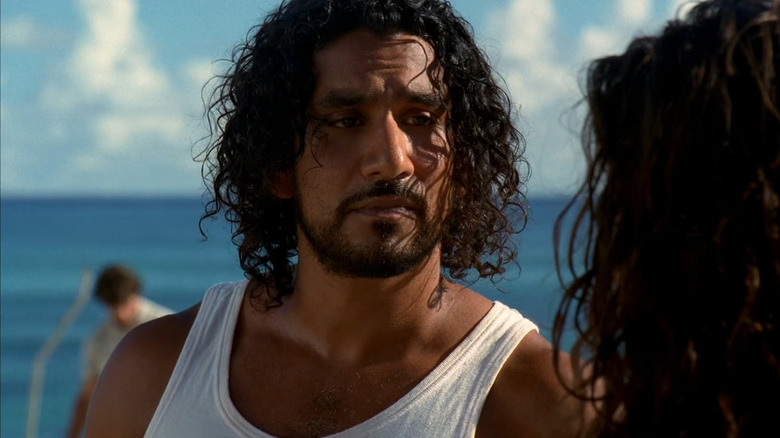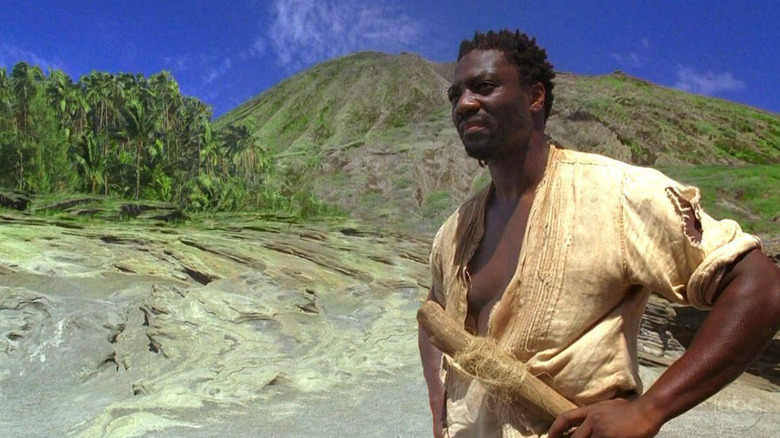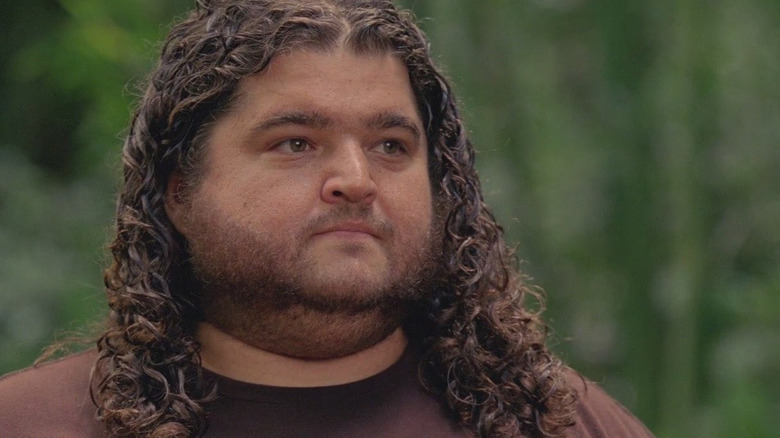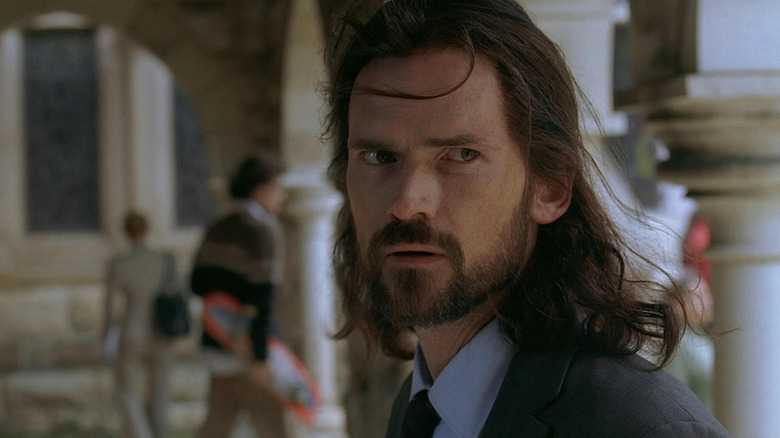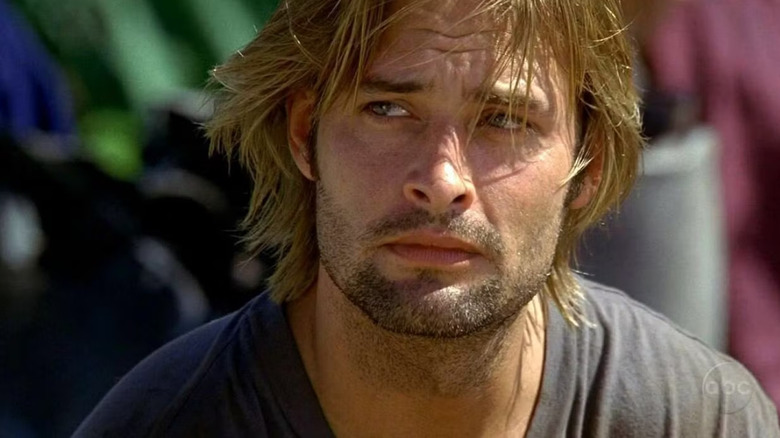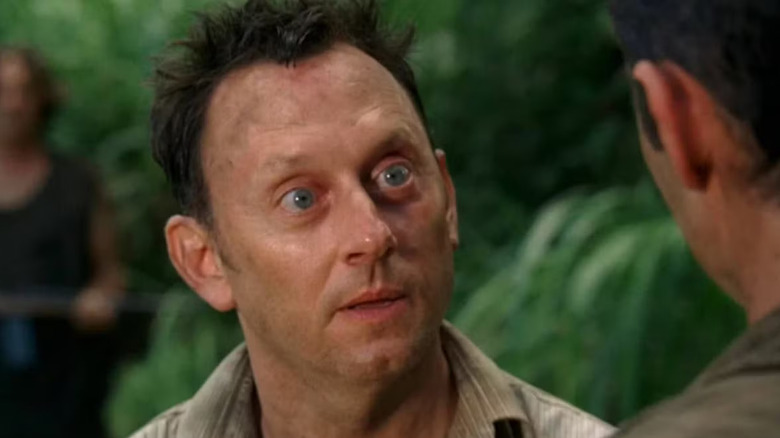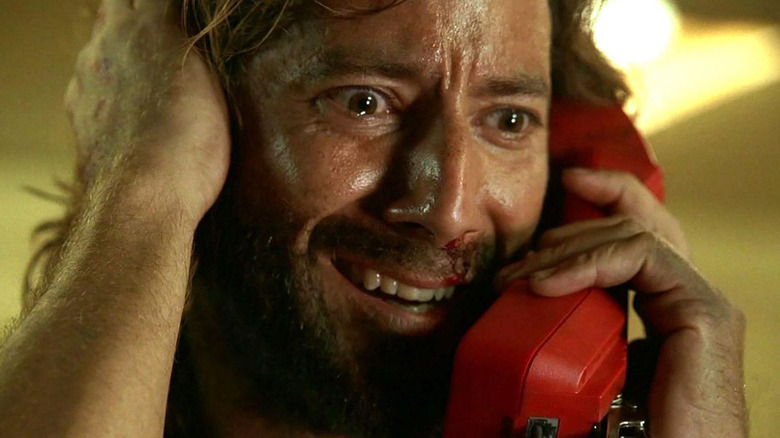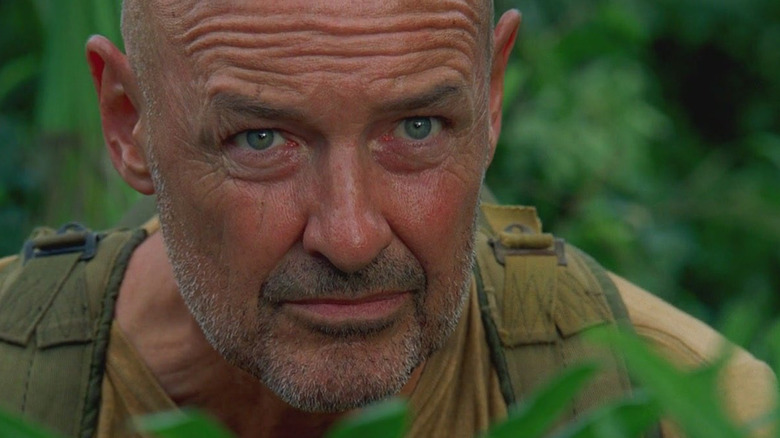The 10 Best Lost Characters, Ranked
Major "Lost" spoilers follow.
The legacy of "Lost" is complicated. On one hand, it cannot be denied that "Lost" changed the face of television in ways that are still being felt today — there would be no "Severance" without "Lost," to use just one recent example. The show was wildly popular, a massive hit that drew viewers in with its cavalcade of mystical mysteries, blending science fiction, horror, romance, quantum physics, religion, mythology, and more into a truly epic saga.
And then that finale happened. To say the "Lost" finale was polarizing is an understatement. These days, it's seemingly a given that the show's final episode was a disappointment; that after riding so high for so long, "Lost" came crashing down to earth. The finale tarnished the show in many people's eyes. But I'm here to tell you that "Lost" remains one of the best shows in TV history. Will I defend that ending? Not really. I just revisited the entire series for the first time, and while I think the majority of the final season is strong, the final episode is indeed just a little too unsatisfying. But that's not enough to undo everything that came before, at least not for me.
While the mysteries were a big draw for "Lost," what kept me coming back to the show week after week were the characters. The show had a massive cast of eclectic characters, all of whom had their own complicated, tragic backstories. The show's flashback format was an ingenious way to dish out info about these people week after week and let us get to know and care about them. And some characters stood out. I want to be clear: I actually think pretty much all of the characters on "Lost" had their worthwhile moments (yes, even Shannon!). But it cannot be denied that certain characters towered over others. With that in mind, I've ranked the 10 best characters on "Lost."
10. Richard Alpert
"Lost" was a show that turned casual viewers into obsessives, which made nearly every minor detail worth paying attention to. As a result, seemingly minor characters had a way of turning into major players. According to Emily St. James and Noel Murray's excellent book "Lost: Back to the Island," Nestor Carbonell's Richard Alpert was only supposed to show up in one episode, as a mysterious figure who recruits Juliet Burke to come to the Island. But everyone liked the way Carbonell, and his shockingly dark eyes, played the part so much that they decided to bring Richard back.
But that wasn't all. To make the character extra enigmatic, "Lost" slowly revealed that Richard seemingly never aged. Flashbacks to different decades showed that Richard somehow always looked to be in his late 30s or early 40s. Eventually, the show would get around to Richard's full backstory: he was a condemned slave who arrived on the island in the late 1800s and asked the god-like Jacob for eternal life in order to avoid the fires of hell. His immortality turned him into Jacob's go-between; the guy who offered guidance to the Others when Jacob could not physically do it himself.
Like many of the characters on "Lost," Richard is a tragic figure, haunted by the death of his wife and cursed to stay the same while the world around him changes. Carbonell makes the character inherently likable — we're rooting for Richard, and thus happy when he ends up being one of the people who actually makes it off the Island in the final episode.
9. Juliet Burke
"Lost" was very much a male-driven show, and while there were a handful of memorable female characters — like main player Kate Austen — the majority of their plotlines revolved around them being love interests and little more. You got the sense that the writers just really didn't know what to do with the women on the Island. Then there's Elizabeth Mitchell's Juliet Burke. At first, it's clear that the writers wanted to have Juliet be an extra angle in the Jack-Kate-Sawyer love-triangle. They even give us a moment where Jack and Juliet share a kiss. But their romance is short-lived. And while Juliet does eventually end up with Sawyer, and their relationship ends up being surprisingly strong, there's a lot more to this character than her love story.
Juliet is a morally complex character, and what makes her so interesting is that the show takes its time revealing her true motivations. She's one of the Others, which implies she might be an antagonist. And when we're first getting to know her, she also seemingly has no qualms about keeping our heroes Jack, Kate, and Sawyer prisoner or pointing guns at them. But little by little, we learn that Juliet's backstory is complicated, as is her relationship with Others leader Ben, who has a bit of a creepy obsession with her (although this is more or less dropped as the show goes on).
A doctor who specializes in fertility, Juliet is haunted by her failures to save pregnant women who keep mysteriously dying on the Island. Eventually, Juliet is firmly established as being more hero than villain (she's even willing to blow herself up if it means saving everyone else), but the road to get there is what makes the character so interesting.
8. Sayid Jarrah
"Lost" arrived in the midst of America's so-called "War on Terror," and having one of the main characters be a former member of Iraq's Special Republican Guard a little over a year after the U.S. invaded Iraq was a bit of a bold move for a TV show at the time. While there's plenty of built-in xenophobia directed at Sayid in the first few episodes — especially from Sawyer — it's established pretty quickly that he's one of the smartest and most capable survivors. He also kicks serious ass.
As played by Naveen Andrews, Sayid is cool, calm, and deadly. And, like pretty much everyone else on the show, he's also haunted by his past. When he was in the military, Sayid was tasked with torturing people, and he's not exactly proud of that. The conflict within Sayid as he grapples with his propensity for violence drives the character throughout the series and keeps him interesting from season to season.
Sadly, the show seems to run out of ideas for what to do with him in the final season, robbing him of some of his charm and power. The series finale also makes the extremely weird decision to reunite him romantically with Shannon (Maggie Grace) in the afterlife, even though he only had a brief fling with her and spent the majority of the show talking about his undying love for childhood friend Nadia (Andrea Gabriel), whom he married. But that mistake aside, it's easy to see why Sayid became such a fan favorite.
7. Mr. Eko
It's a testament to the charisma of actor Adewale Akinnuoye-Agbaje that Mr. Eko became such a memorable, beloved "Lost" character even though he didn't last very long. The behind-the-scenes story goes that the writers had bigger plans for Mr. Eko, but Akinnuoye-Agbaje didn't enjoy being away from home and shooting in Hawaii so he requested that his character be killed off.
Before he died, though, Mr. Eko quickly became one of the best characters on the show. A member of the crashed plane's tail section, the imposing figure had a great, pulpy backstory: forced to become a child soldier in Nigeria, he grew into a crime lord only to then assume the identity of his now-dead brother, a priest. Eko wasn't really a man of God, and yet he embraced his new priestly identity and carried it over to the Island as well, where he found a kind of religious ecstasy lurking in the mysteries. At the same time, he wasn't above smashing people's heads in with a big stick he carried around. He was exactly the type of stoic badass the show needed, and it's a shame he didn't stick around for another season or two.
6. Hugo 'Hurley' Reyes
Frequently the heart and soul of "Lost," Hurley (Jorge Garcia) was the brunt of plenty of fat jokes, but it's worth noting that the show never went out of its way to make the character himself a joke, even when it had him grappling with his food addiction. Sure, Hurley was often called on to provide comic relief, but there was a kindness to the character that made him indispensable.
Hurley gave us the infamous "numbers" (which, to be fair, didn't really amount to much in the end), but he also gave the show, and the characters, some much-needed hope, like when he suggested the survivors construct their own golf course, or when he tricked Sawyer into being nice to everyone for a day. And in the end, it was Hurley who ended up becoming the Island's protector after Jack died saving the world. Everybody loves Hugo.
5. Daniel Faraday
Introduced in season 4, Daniel Faraday quickly became a fascinating character for two reasons: one, he was a science nerd who could seemingly provide answers to a lot of the strange mysteries happening on the Island, and two, Jeremy Davies played the part with such a nervous, weirdo energy that it was impossible to not sit up and take notice of him.
Like all of the characters from the freighter who show up in season 4, Daniel's motives are suspect, but we eventually come to like this guy because Davies makes him so sweet (in a twitchy sort of way). Daniel's experiments with time travel play a big part in the show as the characters find themselves jumping around in time, and the physicist is at first convinced that no matter what the survivors do, they can't change the future. But then he starts to wonder ... what if they can?
This ultimately leads to one of the most heartbreaking storylines in the whole show: Daniel's own mother, the mysterious Eloise Hawking (played by Fionnula Flanagan as an older women and Alice Evans as a younger woman) setting him up to be shot to death, in the past, by her. It's a tragic fate that Daniel is horrified to become aware of just as the life runs out of him. Don't worry, though: Daniel gets to show up again in season 6 in the afterlife — wearing a terrible fedora!
4. James 'Sawyer' Ford
There were a lot of con artists on "Lost," but the king of the cons was, of course, James "Sawyer" Ford, played with oodles of Southern charisma by Josh Holloway. One of the fun things about watching "Lost" was seeing the way the characters evolved and changed as the show chugged along. At first, it seems like Sawyer is going to be an antagonist, and there are multiple occasions where the writers are clearly trying very hard to make him unlikable (I'm looking at you, upsetting scene where Sawyer kills a cute tiny frog). But Holloway was so damn good at turning on the bad boy charm that we couldn't help but fall for Sawyer, even when he was doing questionable stuff.
As a result, Sawyer, a character as fond of giving everyone nicknames as he was of taking his shirt off, became one of the show's biggest heroes, and when he found himself living on the Island in the 1970s as the head of security for the Dharma Initiative with Juliet by his side, we were happy for him — and we understood why he was so ticked off that Jack and the gang showed up to spoil the harmony. By now, you've noticed a theme for the characters on this list: they all have tragic backstories! And that includes Sawyer, who is carrying around the baggage of having witnessed the murder-suicide of his own parents. And yet, despite all the odds stacked against him, Sawyer makes it off the damn Island in the end, and thankfully gets to reunite with Juliet in the afterlife.
3. Benjamin Linus
Let me be perfectly clear: Benjamin "Ben" Linus is a terrible person. A slimy, whiny, scheming murderer who is constantly hurting others in order to stay on top, Ben is the closest thing the show has to an antagonist for a while, until even bigger threats are introduced. But just because Ben is bad news doesn't mean he's not a great character. There's something so fascinating about this deeply flawed worm-boy who wants the one thing he'll never have organically: respect. Sure, Ben assumes a leadership position among the Others. But it's pretty clear they don't really respect him, and they only follow his orders out of a sense of duty, not because they think Ben wields any actual power.
While a lot of what makes Ben a great character must be credited to the writers, the real secret to the character's success is Michael Emerson's performance. Right from the start, Emerson knows exactly how to play this guy as both pathetic and scary. We're afraid of him and we also want to slap him. There were many ways Emerson could've gone too big, too broad with the way he played Ben. Instead, he understood that it was much more interesting to make Ben a pathetic loser rather than an outright sneering villain.
Ben's backstory also gives us some insight into his nature: his father was an abusive jerk, and the dark forces of the Island ended up possessing him after a time-traveling Sayid shot him when he was a child. These things don't excuse Ben's actions, and some of things he does are utterly unforgivable. But they go a long way towards making him seem more three-dimensional, and that makes all the difference.
2. Desmond Hume
Fate and destiny were big themes of "Lost," so it's ironic that one of the show's best characters came about almost through happenstance. The story goes that Henry Ian Cusick was only supposed to show up in three episodes as Desmond Hume, a Scottish bloke who has been pushing a button repeatedly in an underground bunker on the Island for the last three years. However, when Adewale Akinnuoye-Agbaje wanted off the show, the writers had to figure out what to do with a plotline they were cooking up involving time travel and the impending death of fan-favorite character Charlie (Dominic Monaghan). The solution? Bring Desmond back and transfer much of that story to him.
And thank heavens for that, brother, because Desmond is one of the very best things about "Lost" (indeed, most people would pick him as the show's best character, but I've given him the number 2 spot on this list). Funny, likable, and romantic, Desmond is unstuck in time, like Billy Pilgrim in Kurt Vonnegut's "Slaughterhouse Five." Because of this, he's constantly jumping around between the past and present. He's also in a constant struggle to reunite with his beloved Penny (Sonya Walger), the woman he foolishly walked away from when he became convinced he wasn't good enough for her.
There are a lot of love stories on "Lost," and many of them are sweet and effective. But the love between Desmond and Penny is the one viewers ended up caring about the most. I really didn't give a damn if Jack and Kate ended up together, but I needed Desmond and Penny to find each other again. Their romance resulted in the very best episode of "Lost," season 4's "The Constant," in which Desmond and Penny are finally able to reconnect and profess their undying love via a tearful phone call on Christmas Eve. Even after all these years, Desmond emotionally telling Penny, "I love you, Penny. I've always loved you," as Michael Giacchino's heartbreaking score swells, has the power to make me shed a tear or two.
1. John Locke
John Locke is perhaps one of the most tragic figures in TV history, and unquestionably the most well-developed character in all of "Lost." Because of this, it's only fair to name him the best character on the show (Desmond is a close second, though). Played to perfection by character actor Terry O'Quinn, Locke came to the Island literally a broken man — he was paralyzed after being pushed out a window by his con artist father (a con artist father who, by the way, had previously tricked John into donating him one of his kidneys). The magic of the Island miraculously healed Locke and enabled him to walk again, and this almost immediately converted the man into an Island disciple. If Dr. Jack Shephard was the man of science, John Locke was the man of faith — a true believer who wanted nothing more than to serve the Island and its magic secrets.
And that's what makes his arc all the more heartbreaking. Because in the end, no matter how much he was willing to give himself over completely to the Island, Locke still ended up being brutally strangled to death by Ben. Sure, he became the leader of the Others ... for about a day or two. And then it was all over — he was forced to leave the Island, ended up back in his wheelchair, was on the verge of committing suicide, and then murdered. It's bleak stuff!
Locke's zealous devotion turned him from protagonist to antagonist, and perhaps the darkest element of his story is that the final season saw the villainous, supernatural Man in Black, aka the Smoke Monster, using Locke's body as a disguise. As Jack rightfully says, "You disrespect his memory by wearing his face but you're nothing like him. It turns out he was right about almost everything." Sure, you could argue that Locke ultimately gets a happy ending in the afterlife with all the other characters, but everything leading up to that was sad and depressing for a man who wanted nothing more than to prove to the world he was special.
